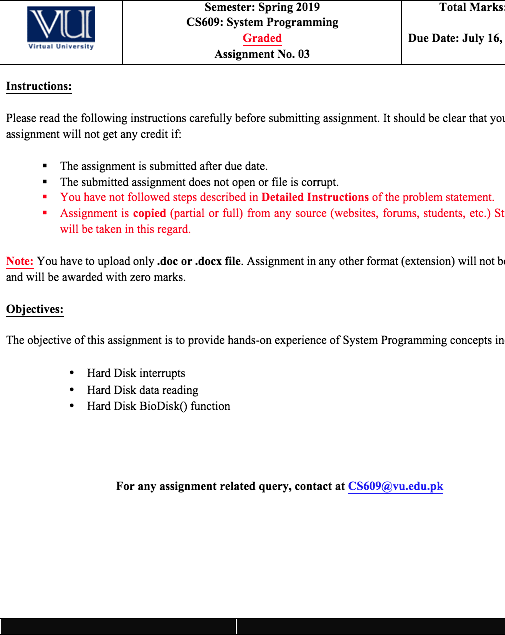CS609 Assignment No. 03 Solution and Discussion
-

Semester: Spring 2019
CS609: System Programming
Graded
Assignment No. 03
Total Marks: 20Due Date: July 16, 2019
Instructions:
Please read the following instructions carefully before submitting assignment. It should be clear that your assignment will not get any credit if:
♣ The assignment is submitted after due date.
♣ The submitted assignment does not open or file is corrupt.
♣ You have not followed steps described in Detailed Instructions of the problem statement.
♣ Assignment is copied (partial or full) from any source (websites, forums, students, etc.) Strict action will be taken in this regard.Note: You have to upload only .doc or .docx file. Assignment in any other format (extension) will not be accepted and will be awarded with zero marks.
Objectives:
The objective of this assignment is to provide hands-on experience of System Programming concepts including:
• Hard Disk interrupts
• Hard Disk data reading
• Hard Disk BioDisk() functionFor any assignment related query, contact at [email protected]
Problem Statement:
Q: Write a program which reads two physically addressed blocks from disk using biosdisk() function.
Instructions:
• Declare arrays to handle head, sector and track numbers to read from hard disk.
unsigned char headno[10];
unsigned char secno[10];
unsigned char trackno[10];
• Similarly declare a buffer of 1024 char to store data 2 blocks data etc.
• unsigned char buf[1024];
• Use printf to print message of entering head no. i.e printf("Head ");
• Use gets function to get head no. from user i.e gets(headno);
• Use puts function to put headno in array of headno
• Use biodisk function to read two blocks i.e
biosdisk(2,0x80,atoi(headno),atoi(trackno),atoi(secno),2,buf) ;
• Similarly get and put sector and track numbers.
• Show error message in case of failure of biodisk() function.Note: Your assignment file should be a single Word file (.doc or .docx) containing code only.
Best of Luck!
-
@Anaya-Ali
-
Idea Solution
#include #include FILE *fp; unsigned char buf[1024]; unsigned char st[60]; unsigned char headno[10]; unsigned char secno[10]; unsigned char trackno[10]; void main (void) { int i ; for (i=0;i<1024;i++) buf[i]=0; gets(st); fp=fopen(st,"wb"); printf("Head "); gets(headno); puts (headno); i = biosdisk(2,0x80,atoi(headno), atoi(trackno),atoi(secno),2,buf) ; if (*(((char *)(&i))+1)==0) { fwrite(buf,2,1024,fp); fclose(fp); } else printf("Cannot Read Error# = %x",i); } -
@moaaz
Another Idea solution#include <bios.h> #include <dos.h> FILE *fp; unsigned char buf[1024]; unsigned char st[60]; unsigned char headno[10]; unsigned char secno[10]; unsigned char trackno[10]; void main (void) { int i; for (i=0; i<1024; i++) buf[i]=0; gets(st); fp=fopeon(st,”wb”); printf(“Head”); gets(headno); puts(headno); printf(“/nsector ”); gets(secno); puts(secno); printf(“/ntrack ”); gets(trackno); puts(trackno); i = biosdisk(2, 0x80, atoi(headno), atoi(trackno), atoi(trackno), 2,buf); } if(*(((char *)(&i))+1)= =0) { fwrite(buf,2,1024,fp); fclose(fp); } else { printf(“Cannot Read Error# = %x” i); }